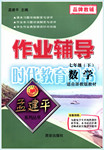题目内容
The thieves _____ him _____ in the park, took his wallet and escaped.
A. held .. back B. held .. up
C. held .. on D. held .. out
B
解析:
hold up sb.拦劫。hold up, hold on, hold out 的用法请参阅III.82,83注释.

 作业辅导系列答案
作业辅导系列答案Two thieves came to a house to steal something. They dug a hole in the wall of the house.
There lived many mice in the house. The woman in the house saw a mouse crawl(爬行) into the house in the moonlight. “Look! In comes one,” she said to the man in the house. The thief was so frightened that he hurriedly crawled out of the house and said to the one waiting outside, “She found me when I was just in.” But the thief outside didn’t believe him, so he said, “Let us try to crawl into the house together.” At that time two mice happened to crawl into the house, too. The woman saw the mice and shouted, “In come two, catch them!” The two thieves were terribly frightened. The man in the house said, “You saw them come in but where are they? I will catch them tonight.” The two thieves started running away at once.
The two thieves wanted to make it clear whether they had been found or not the night before. The next day they acted as men selling sweet potatoes and came before the house. The man and the woman were ploughing in their fields. The rope broke and the woman came home for a rope. She saw two men selling sweet potatoes and wanted to buy some. She picked out two which looked like mice. At the time the man couldn’t wait for her any longer in the fields and he ran back from the fields to hurry her up. The woman showed the sweet potatoes to the man and said, “How they look like the two of last night.” The man said, “I asked you to fetch a rope, why don’t you hurry for it?” The two thieves ran away very quickly without their sweet potatoes.
1.The two thieves failed to steal anything from the house because _____.
|
A.they were found out |
|
B.they were frightened by what they had heard in the house |
|
C.they didn’t work together well with each other |
|
D.mice stopped them from doing so |
2.From the last paragraph, we know that _____.
|
A.the two thieves were famous selling sweet potatoes |
|
B.the woman recognized the two thieves |
|
C.the woman pretended to know nothing about the two thieves and made fun of them |
|
D.the two thieves didn’t know that they were not found at all |
3.When the woman said, “How they look like the two of last night!” _____.
|
A.she referred to the two thieves |
B.she meant nothing |
|
C.she said it on purpose |
D.she referred to the mice |
4.“____________”is the best title for this passage.
|
A.Two Clever Thieves |
B.Terrible Mice |
|
C.Hit the Mark by a Fluke(侥幸) |
D.A Clever Coupe |
5.Which of the following statements is NOT true?
|
A.The two thieves not only failed to steal things but also lost their sweet potatoes. |
|
B.Whenever they found mice, the people in the house would try to catch them. |
|
C.The two thieves ran away at once, because they thought the woman had seen them. |
|
D.The man let the woman go home for a rope, which would be used for catching the thieves. |